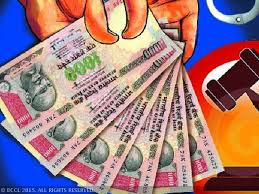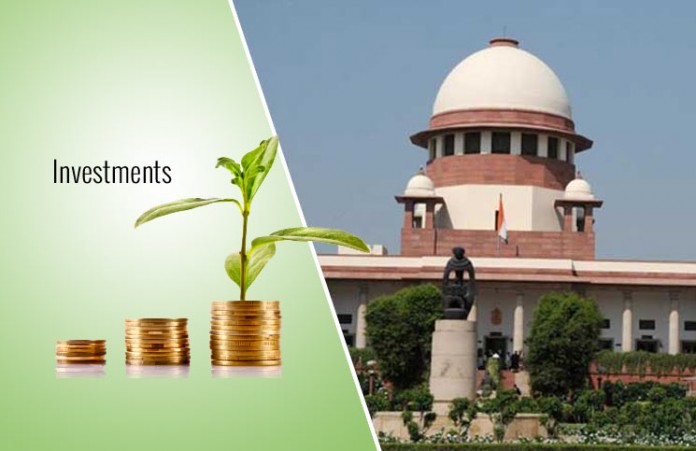In this blog post, Seuj Bikash, an Advocate, presently practicing in the Gauhati High Court who is also currently pursuing a Diploma in Entrepreneurship Administration and Business Laws from NUJS, Kolkata, analyzes the significance of the Securities Contracts (Regulation) Act,1956 in raising investments.
Introduction
The Securities Contracts (Regulation) Act,1956, that is, the SCRA, 1956 is one of the very important pieces of legislation which governs the affairs related to the stock market in India. The Stock market is the platform of security trading or transactions.  For the economic development of the nation, the role played by the Stock market is indispensable. The Stock market helps in the mobilization of the funds from the small savings of the investors and channelizes such resources into different developmental needs of various sectors of the economy.
For the economic development of the nation, the role played by the Stock market is indispensable. The Stock market helps in the mobilization of the funds from the small savings of the investors and channelizes such resources into different developmental needs of various sectors of the economy.
The SCRA, 1956, aims at preventing undesirable transactions in securities by regulating the business of dealing therein and by providing for certain other matters connected therewith. Some provisions of the SCRA which are very important from the point of view of raising investment are explained below.
Significance of SCRA,1956 in Raising Investment
The SCRA contains some important provisions which have an encouraging impact from the perspective of raising investment for various economic activities under different sectors of the economy.
The recognition of stock exchanges:
The SCRA, in Section 3 of the Act, has provided for a specific procedure which enabled the stock exchange desirous of being recognized by the Government to apply in the manner prescribed by the act. The Procedures relating to granting of recognition by the Government to the stock exchange are explained in Section 4 of the SCRA. Simultaneously, the SEBI (Securities and Exchange Board of India) is also empowered to give recognition to the Stock Exchange.  It is explicitly provided by the SCRA that prior to granting recognition to a stock exchange, the Central Government has to be satisfied after proper inquiry that the rules and bylaws of a stock exchange applying for registration are in conformity with the prescribed conditions in order to ensure fair dealing and to protection of the interest of the investors. The SCRA also has provided for other conditions for recognition of stock exchange which increase the Government control and interference, such as, conditions related to qualifications for membership of stock exchanges; manners in which the contracts shall be entered into and enforced as between members; the representation of the Central Government on each of the stock exchange by such number of persons not exceeding three as the Central Government may nominate in this behalf; etc.These provisions related to the Government control and interference incorporated in the SCRA are meant for ensuring the protection of the interest of the investors.
It is explicitly provided by the SCRA that prior to granting recognition to a stock exchange, the Central Government has to be satisfied after proper inquiry that the rules and bylaws of a stock exchange applying for registration are in conformity with the prescribed conditions in order to ensure fair dealing and to protection of the interest of the investors. The SCRA also has provided for other conditions for recognition of stock exchange which increase the Government control and interference, such as, conditions related to qualifications for membership of stock exchanges; manners in which the contracts shall be entered into and enforced as between members; the representation of the Central Government on each of the stock exchange by such number of persons not exceeding three as the Central Government may nominate in this behalf; etc.These provisions related to the Government control and interference incorporated in the SCRA are meant for ensuring the protection of the interest of the investors.
Corporatisation and demutualisation of stock exchanges:
The term Corporatisation, in the Section 2.(a)(a) of the SCRA, inserted by the Security Laws (Amendment) Act,2004, means the succession of a recognised stock exchange, being a body of individual or a society registered under the Societies Registration Act,1860, by another stock exchange, being a company incorporated for the purpose of assisting, regulating or controlling the business of buying, selling or dealing in securities carried on by such individual or society. In plain words, it means the conversion of a stock exchange into a corporate entity limited by shares from its earlier non-corporate form.
Demutualization is the process of which a customer-owned mutual organization or co-operative changes legal structure to form a joint stock company. The word “Demutualisation” as defined by Section 2.(ab) of the SCRA, inserted by the Security Laws (Amendment) Act,2004, means the segregation of ownership and management from the trading rights of members of a recognised stock exchange in accordance with a scheme approved by the Securities and Exchange Board of India. The process of demutualisation separates ownership, trading, and management on a stock exchange.
 The SCRA,1956 as amended by the Security Laws (Amendment) Act,2004 provided for mandatory corporatisation and demutualisation of the stock exchange by the provisions contained in Section 4(B) of the Act. The Section 4(B) states that all recognized stock exchanges, except the ones which have been notified by the SEBI in the Official Gazette as already corporatised and demutualised, shall submit a scheme for corporatisation and demutualisation within a period prescribed by the SEBI.If the SEBI is satisfied that it would be in the interest of the trade and also in the public interest, then the SEBI approves the Scheme with or without modification. A recognized stock exchange, in respect of which the scheme for corporatisation and demutualisation has been approved, shall ensure that at least fifty-one percent of its equity share capital is held by the public other than the shareholders having trading rights. Such provision is certainly efficacious for raising investment from the public.
The SCRA,1956 as amended by the Security Laws (Amendment) Act,2004 provided for mandatory corporatisation and demutualisation of the stock exchange by the provisions contained in Section 4(B) of the Act. The Section 4(B) states that all recognized stock exchanges, except the ones which have been notified by the SEBI in the Official Gazette as already corporatised and demutualised, shall submit a scheme for corporatisation and demutualisation within a period prescribed by the SEBI.If the SEBI is satisfied that it would be in the interest of the trade and also in the public interest, then the SEBI approves the Scheme with or without modification. A recognized stock exchange, in respect of which the scheme for corporatisation and demutualisation has been approved, shall ensure that at least fifty-one percent of its equity share capital is held by the public other than the shareholders having trading rights. Such provision is certainly efficacious for raising investment from the public.
The corporatisation demutualisation of stock exchanges is beneficial from the perspective of raising investment since it ensures increased access to resources for capital investment raised by way of equity offerings or private investment. Further, it leads to greater participation of the investors in the governance of the stock exchange and allows greater flexibility and access to global markets.
The Section-5 of the SCRA enables the Central Government to withdraw the recognition granted to a stock exchange under the provisions of the said act in the interest of the trade or the public interest following the procedure provided by the Act in this regard.
Central Government’s control over the recognized stock exchanges:
The SCRA has provided for several other provisions which strengthen the control of the Central Government and SEBI over the functioning of recognized stock exchanges which enables the Government to take necessary actions to ensure raising of investment, protect the interest of the trade and public interest. Section 6 of the SCRA requires the recognized stock exchanges to furnish periodical returns to the SEBI relating to the affairs of the stock exchange. The SCRA empowers the SEBI to direct inquiry and call for inquiry report in relation to the affairs of any member of the stock exchange.
Section 7 of the Act requires annual reports to be furnished by the stock exchanges to the Central Government. The Section 8 of the SCRA further empowers the Central Government to make rules, direct a stock exchange to make any rule or make amendment of already existing rules related to the affairs of the stock exchange as the government may deem fit. The SCRA has provided for various other provisions authorizing the Central Government and SEBI to regulate, control and interfere with different affairs and aspects of the recognized Stock Exchanges for the protection of interests of the investors.
Provisions related to Listing of Securities:
The SCRA also contains provisions related to listing of securities to the Securities Exchange. Listing means an admission of securities of any incorporated company, central and state government, quasi-governmental and other financial institutions, corporations, etc. to dealings on a recognized stock exchange. The most important objectives of listing are to provide ready marketability and impart liquidity and free negotiability to stocks and shares, ensure proper supervision and control of dealings therein and protect the interest of shareholders and the general public.  As listed securities are officially traded, the liquidity of investment by the investors is well ensured.
As listed securities are officially traded, the liquidity of investment by the investors is well ensured.
Section 21 of the SCRA states that where securities are listed on the application of any person in any recognized stock exchange, such person shall comply with the conditions of the listing agreement with that stock exchange. A recognized stock exchange may delist the securities as provided by the Section 21A of the act on any of the grounds prescribed under the act after giving a reasonable opportunity of being heard to the person affected by such action.
Conclusion
The SCRA is an enactment to provide for direct and indirect control of all aspects of securities trading, running of stock exchanges and to prevent undesirable transactions in securities. The SCRA,1956, among other provisions, making provision as to recognition of the stock exchanges by the Government, providing for their corporatisation and demutualisation, ensuring adequate government control over the functions and affairs of the stock exchanges in the interest of investors, has contributed to a healthy, disciplined and beneficial platform for the dealings in security. Due to such provisions contained in the Act, there has been a raising in investment.
 Serato DJ Crack 2025Serato DJ PRO Crack
Serato DJ Crack 2025Serato DJ PRO Crack










 Allow notifications
Allow notifications


